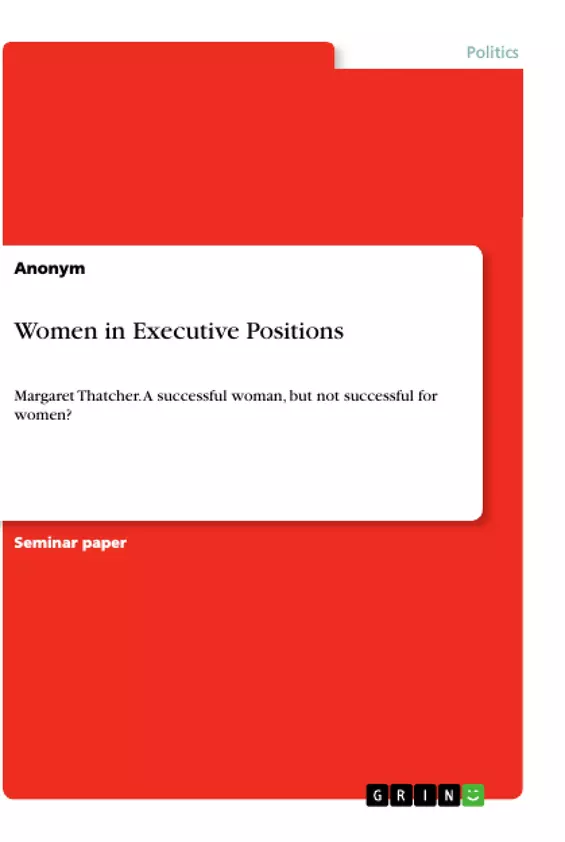The number of women in executive positions is increasing. Feminist literature tried to analyse the way they get to power and how their politics support women. Margaret Thatcher as the first female Prime Minister in Britain and her agendas evoked a certain ambivalence. The goal was a globally competitive Britain through a liberal market and this affected the majority of women. This paper is going to reflect published article and books concerning the Thatcherism and women in the changing British society. Gender and class are determining factors for every individual and their dependancy on the family, the work and the state. Thatcher's policies were not directed at women, but they are mostly affected by cuts in welfare state and this caused collateral damage.
Inhaltsverzeichnis (Table of Contents)
- Introduction
- A women as Prime Minister: Margaret Thatcher
- Thatcherism and women
- Thatcher and her priority
- Family role, responsibility and structure
- The welfare state
- Work, capitalism and gender
- Consequences for women
- Lone mothers as an example for the most affected women in Britain
- Conclusion
Zielsetzung und Themenschwerpunkte (Objectives and Key Themes)
This paper aims to investigate the impact of Margaret Thatcher's policies on women in Britain. It specifically examines the question of whether Thatcher, despite her own success as a woman in a leadership position, ultimately benefited women as a whole.
- The role of women in executive positions
- The impact of Thatcherism on traditional family structures and roles
- The influence of Thatcher's economic policies on women, particularly lone mothers
- The interplay of gender and class in shaping women's experiences in Thatcherite Britain
- The question of whether Thatcher's policies were deliberately targeted at women or had unintended consequences for them.
Zusammenfassung der Kapitel (Chapter Summaries)
The paper begins with an introduction that frames Margaret Thatcher's legacy within the context of feminist literature and political science. It highlights the debate surrounding her impact on women's rights and equality.
Chapter 2 focuses on Thatcher's rise to power, highlighting her exceptional personality and the impact she had on Britain's political, social, and economic landscape. The chapter draws from comparative studies of gender and leadership, emphasizing the challenges women face in achieving executive positions in a world often seen as dominated by men.
Chapter 3 delves into the core of Thatcherism and its impact on women. It examines the principles of Thatcher's economic and social policies, particularly their impact on traditional family structures, family roles, and women's responsibilities within the family unit. The chapter highlights the contradictions within Thatcherism, exploring the consequences for women in both their family and public lives.
Chapter 4 focuses on the specific consequences of Thatcher's policies for women, particularly lone mothers. It analyzes the role of the welfare state in supporting families and the impact of its reduction under Thatcher's leadership. The chapter examines the argument that Thatcher's policies, while not directly targeting women, may have had unintended negative consequences for them.
Schlüsselwörter (Keywords)
Key words and focus topics include: Margaret Thatcher, Thatcherism, women in executive positions, gender politics, family structures, welfare state, economic policies, lone mothers, collateral damage, Britain.
Frequently Asked Questions
How did Margaret Thatcher's policies affect women in Britain?
While Thatcher was the first female Prime Minister, her neoliberal policies and cuts to the welfare state often had negative "collateral damage" on the majority of women.
What is the central ambivalence of "Thatcherism" regarding gender?
The ambivalence lies in Thatcher's personal success as a woman in power versus her agendas that prioritized liberal markets over gender equality or social support.
How did welfare cuts impact lone mothers?
Lone mothers were among the most affected groups, as they relied heavily on state support which was significantly reduced under Thatcher's leadership.
Did Thatcher's policies target women specifically?
No, her policies were generally not directed at women, but because of women's specific roles in the family and work, they were disproportionately affected by her reforms.
What role do gender and class play in Thatcherite Britain?
The paper argues that gender and class were determining factors that shaped an individual's dependency on the family, the state, and the capitalist work environment.
- Citar trabajo
- Anonym (Autor), 2014, Women in Executive Positions, Múnich, GRIN Verlag, https://www.grin.com/document/985291



